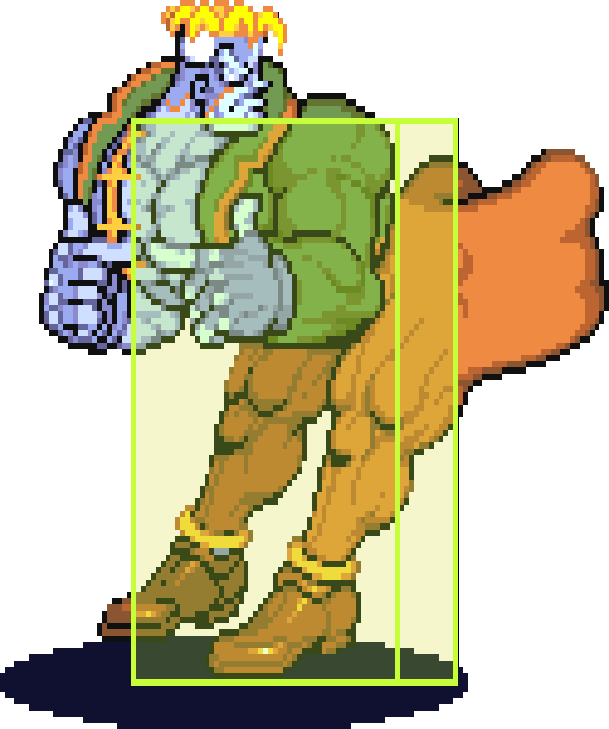The story of Frankenstein begins, as all great stories do, with an explosion. The 1815 eruption of Mount Tambora seeded enough volcanic debris into the atmosphere to alter the climate the world over. Frigid temperatures, dreary skies and torrential rains marked the following “Year Without a Summer”, and were a particular bummer to a group of writers attempting to vacation in Geneva. This group consisted of bisexual icon Merry Shelly, bisexual icon Lord Byron, speculated bisexual icon Percy Shelly and Byron’s physician and speculated unrequited admirer John Polidori. So what could this funky bunch of bisexuals do to brighten the mood? Telling ghost stories, of course.
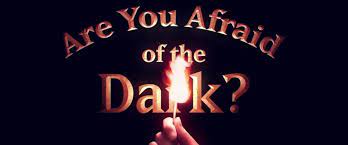
For this inaugural meeting of The Midnight Society, Lord Byron proposed a contest to see who could write the spookiest story. Having spent the holiday being mocked by his employer, Polidori would spin off a story concept pitched by Byron but rework the villain — a bloodsucking parasite hiding behind the veneer of a suave aristocrat — into a caricature of Lord Byron that would be instantly recognizable to anyone who knew him. The resulting work The Vampyre is both the nexus of the modern vampire genre and a really funny story of getting one over on a shitty boss.
Despite the high bar, Merry Shelly’s contribution would still manage to clear – ultimately ranking alongside Moby Dick and The Picture of Dorian Gray as one the great works of English literature. Also like Moby Dick and The Picture of Dorian Gray, it is utterly and completely devoid of symbolism or metaphors. You know her story of a modern prometheus as Frankenstein.
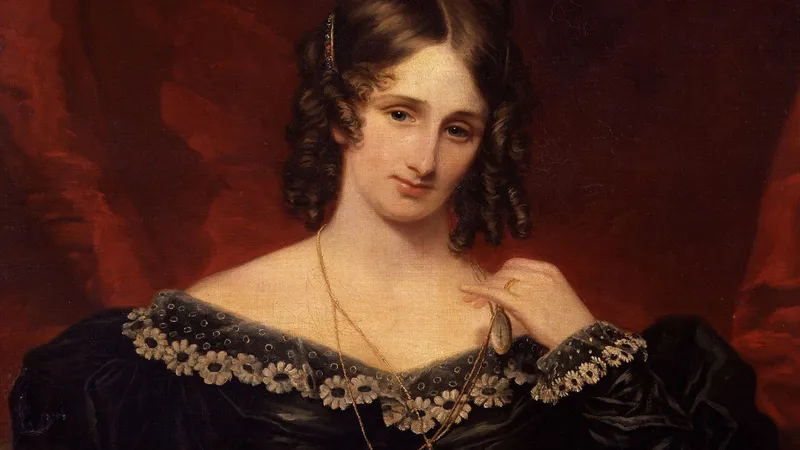 “I was so ready to give myself away — and being afraid of men, I was apt to get tousy-mousy for women" - Marry Shelly
“I was so ready to give myself away — and being afraid of men, I was apt to get tousy-mousy for women" - Marry Shelly
In the original vision, Victor Frankenstein is a multiclassed alchemist/scientist determined to create life with the kind of bravado only a nepo baby can muster. He carefully selects only the most handsome of body parts for his creation, but is horrified at the result and abandons him. The Creature, despite being initially kindhearted, gradually becomes jaded by repeated rejection. In a final bid to find happiness in the world, The Creature asks Frankenstein to make him a companion. Frankenstein initially agrees, but grows both horrified and fixated on the idea that the two creatures might reproduce. In an all-timer effort in making a personal problem into everyone else’s problem, Frankenstein destroys the companion before bringing the body to life.
From this point on, Frankenstein and The Creature become entwined in a downward spiral of mutual destruction starting with the vindictive murder of Frankenstein’s fiancee by The Creature. Their feud only ends when Frankenstein dies of exposure having pursued The Creature to the North Pole. With his creator dead, The Creature mourns both his creator’s passing and the loss of any chance at reconciliation between them. Left with a pyrrhic victory and without purpose, The Creature resolves to burn himself on a pyre but whether he actually does so – and whether doing so could kill him – is left ambiguous.
Not a drop of symbolism to be found. Just a simple story about guys being dudes. One of those dudes also just happens to be wholly disinterested in his fiance and obsessed with devising a means of creating life that doesn’t involve women. You can imagine my horror when Hideo Kojima’s friend and noted symbolism-enjoyer Guillermo del Toro announced he was working on his own adaptation of Shelly’s novel.
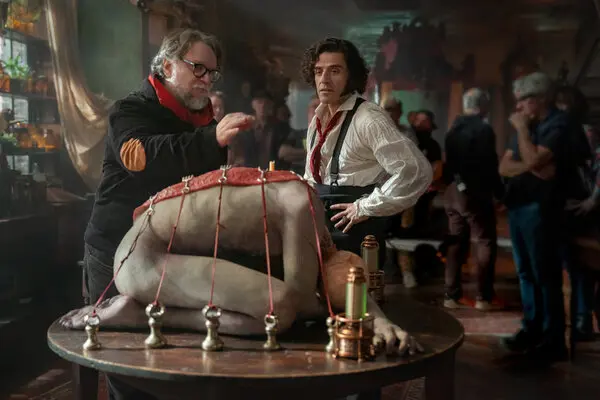
Del Toro has been open about his adoration for Frankenstein, calling Shelly’s story the most important book of his life and The Creature his favorite monster. Even back in 2012, he was publicly discussing his desire to eventually adapt the story to film — vowing to do it “the right way.” Frankenstein is an interesting case where the source material is culturally shadowed by the (admittedly very excellent) 1931 film. More direct adaptations have been attempted but have failed to step out of Borris Karloff’s shadow. Considering that Del Toro’s punch-up of the Gil-man as a sexy Jesus-fish won him an Academy Award for best picture, I was locked in to see what he felt the “right way” to approach the story would be.
Just before Halloween, I was lucky enough to see a limited screening of the film.
I can’t even joke about it; the film is stunning even down to the minutia of how color is used — I immediately felt a need to rewatch just to focus on varied saturation in the color blue. The movie understandably makes some departures from Shelly's story -- some minor, some major, and some more effective than others. I was fully prepared for this to be my favorite new release of the year but, after some choices made in the closing act of the story, I’m not so sure. I imagine that I’m not the only person who is going to walk away from this one feeling conflicted as to whether they detract from the story, elevate it or whether this movie is even the same story. Hence why I’m writing this and probably why you’re still reading.
— Spoilers for Frankenstein —
Del Toro’s departures from Shelly’s story are minor at first but build to a radical departure in the final act. In the original story, Frankenstein’s Monster is well...a monster. After Frankenstein reneges on creating a companion for The Creature, he becomes a demon — engaging in a campaign of terror to destroy the life of his creator just as he sees his creator as having destroyed his own. The Creature’s loss of innocence is at the heart of Shelly’s tragedy. Despite Frankenstein's insistence to the contrary, his creation was human in the very best and very worst ways we all are.
In Del Toro’s vision of the story, The Creature is Jesus. It’s not even subtle. The Creature is hoisted on a cross during the resurrection scene and it is speculated that The Creature might be born without original sin — purer than the common man. I know I made that riff about symbolism in Del Toro’s films, but “Creature = Jesus” is only barely subtext. To that end, the story is rewritten to make The Creature the goodest boy possible. Yes, he still kills Frankenstein's brother but now it’s arguably an accident or self-defense. Frankenstein's fiancee still dies but now it’s Frankenstein himself who shoots her when she moves to take a bullet for The Creature. This makes The Creature’s victimhood in the narrative inarguable, but also removes The Creature’s flawed humanity.

I'm surprised there wasn't a scene of The Creature carrying that cross
As much as The Creature is that much more innocent here, Frankenstein himself is that much more monstrous. Shelly’s character is pitiable and rather pathetic. Here, he is all that but also contemptible, petty and self-aggrandizing. Since The Creature is now almost entirely blameless in the outcome of the story, what connects them isn’t a chain of retaliatory mutual self-destruction, but rather Frankenstein’s one-sided vindictiveness. In a scene that felt like a shitpost, a character even looks Victor in the face and says, with their dying breath, “you’re the monster.” Something something authors that use subtext something something cowards.
The film also adds focus on how Frankenstein came to be the man he is. The opening act of the film shows Victor Frankenstein as a child and his troubled relationship with his own father. Himself a famous surgeon, Frankenstein Sr. demands his son both carry on and exceed his own reputation. When this literal child fails to meet those lofty expectations, his father beats him in ways that are mirrored in how Victor treats his own creation later on. At last, the world has a biblically accurate Frankenstein that is both the scientist, the monster and a monster created by someone named Frankenstein.
This added emphasis on Frankenstein's family history makes the theme of generational trauma even more overt than in Shelly’s original work, which is saying something. However, it does parlay that theme in a very different direction. The novel portrays generational trauma as an unbroken cycle wherein Frankenstein’s failings precipitate The Creature’s own turn toward violence. When The Creature lashes out at him, Frankenstein retaliates. Neither of them are able to change course away from the inevitable conclusion of their feud. Their shared trauma is a chain weighing them both down as they sink deeper into despair — something that connects and dooms them both.
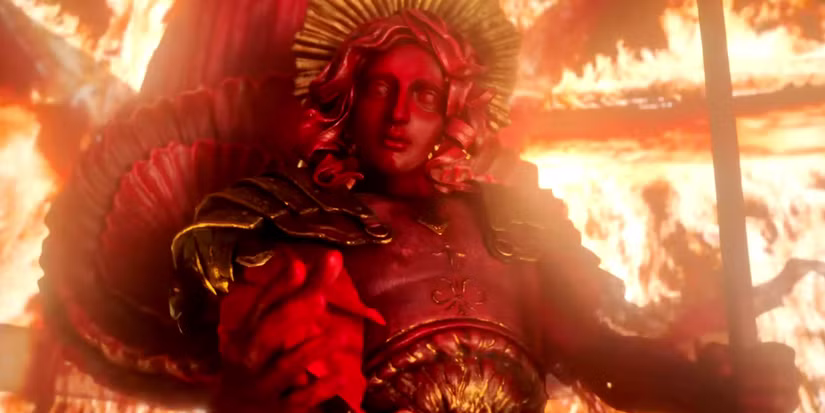
Y'all ever heard about Catholicism?
Del Toro completely reimagines the ending of the story. Rather than empty victory or defeat, the pair gets a final chance at reconciliation. The Creature comes onto the ship, delivers the second half of the narration and Frankenstein, still alive but dying, is so moved by his extremely handsome creation’s story that he apologizes for all his wrongdoings. The two reconcile, with Frankenstein using his dying words to urge The Creature to live. The film closes with a shot of The Creature walking off into the tundra to an uncertain future. Followed by a genuinely baffling quote from Lord Byron, a man who happened to be in the room while Merry Shelly laid down one of the greatest stories penned in the English language.
This move to anchoring the story around reconciliation shifts things around so much that it may as well be a different story. Which makes me wonder if that’s what Del Toro meant when he said he intended to do this story “the right way.” It does make me wonder whether some choices in the film were the product of Del Toro being unable to kill his darling. I find myself going back and forth on it. The ending lands oddly considering how the previous departures make Frankenstein that much more monstrous, and his sudden deathbed face-turn leaves the audience with whiplash. If Frankenstein was going to realize that he’s been the villain of the story and express regret, maybe that thought should have occurred to him sometime before he pursued The Creature to the North Pole.
I left the theater looking for a way to parse the ending. Using my giant PhD brain, I started to wonder if the abruptness is the point and this ending isn’t actually so saccharine. Had Del Toro intended the audience to read Frankenstein’s deathbed push for reconciliation as disingenuous? He has spent his entire life refusing to see himself as anything but the aggrieved protagonist of reality. His asking for forgiveness from The Creature is one final act of manipulation. He even asks The Creature to call him by his first name — literally naming him the victor just before the curtain falls. The Creature, still wanting the approval of his father despite everything that has transpired between them, can’t bring himself to deny his creator. And maybe none of that matters. In order to live the life he has been given, The Creature has to put his creator behind him and break the cycle of generational trauma.
This reading fixes almost every issue I have with the ending but it also requires making an inferential move in a movie that seems to otherwise want audiences to keep their hands and feet inside the vehicle at all times. I still can’t believe “you’re the monster” isn’t from a shitpost.
Despite all my grumbling, I have to confess that I still cried.
In retrospect, going to see Frankenstein after having yet another frustrating conversation with my own father was certainly a choice. For myself and far too many people, family is a difficult subject. I am a transgender woman. An unfortunate part of learning to love myself has been learning that my parents do not love me — at least not unconditionally. I never asked to be born but, from the moment I came into the world, there were unspoken expectations on what kind of son I was supposed to be. I failed to meet them. Even when the ebb and flow of our relationship is at a high point, it’s only ever a matter of time before I’m reminded that, in my parents’ eyes, I am an embarrassment. I am a failed experiment; a creature built from mismatched parts haphazardly stitched together.
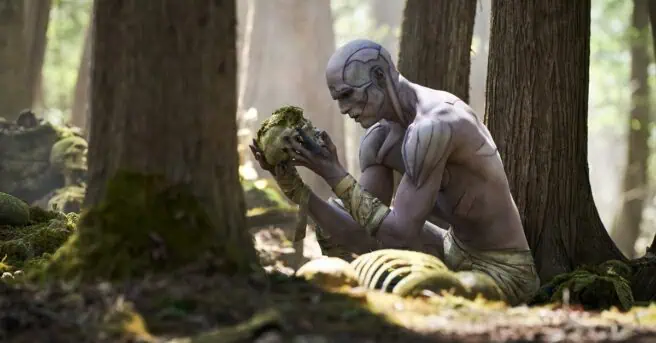
For myself and I imagine far too many other queer people, it’s hard not to see ourselves reflected in The Creature. While watching the reconciliation between a father and son unfold, I felt something tug inside me and started to cry. Even now, if my own father were to ask me for forgiveness, even if I knew he was only acting out of self-interest, I know I would give it to him. Despite any misgivings I have with the ending of the movie, I understand why The Creature would forgive Frankenstein at the climax of this story. Because I know that I would too. t I also can’t fully bring myself to let go of that desire for even a scrap of approval, even disingenuous approval, from the people who made me.
Were I to change one thing about this movie I would replace the closing quote from Byron with one from Merry Shelly herself: “A slavish bondage to parents cramps every faculty of the mind.”
Until next post, be nice to yourself
